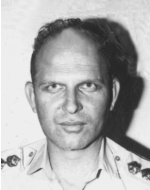Son of Rivka and Moshe. He was born on October 3, 1933 in Kfar Hess, to an agricultural family among the founders of the Yishuv. When he was ten, he moved with his parents to live in Rishon Letzion. Zvi studied at the local elementary school and continued at the “Samet” vocational high school in Haifa, and was drafted into the army in 1951. Because he was technically educated, he was assigned to the Ordnance Corps. After basic training, he was sent for a course in a car instructors course and immediately afterwards went on to an officer’s course. At the end of the course he was given command of a department in the Military Rehabilitation and Maintenance Center, and was later appointed deputy commander of an ammunition base, and in 1954 he went to study at the Technion. . In 1961, he was ordained as a mechanical engineer and was assigned as a commander of a weapons branch at the main training base of the Ordnance Corps. During this period, Zvi married Edna. He was an exemplary family man and they raised and raised three children – Alex, Alon and Michal. In 1964 he was loaned by the IDF to the Foreign Ministry in order to establish a Technion in Liberia and to serve as its president, but due to a family problem he remained in Israel .In 1966 he was appointed commander of the production workshop in a rehabilitation and maintenance center, Who at the time decided the fate of the battle in the Six-Day War.Then the Six-Day War, Zvi was awarded the rank of lieutenant colonel and he was appointed commander of the workshop to be assembled in the organization. In the course of this period, the IDF was engaged in adapting the Russian tanks to the Armored Corps and transferring obsolete tanks to moving cannons, under the command of Zvi, during which time he worked with Major General Israel Tal in the development of the Merkava tank and embarked on many purchases in the United States and Germany , During which he forged working ties and friendship with senior members of the US Armament Corps, and his successes in this position led to his appointment as deputy commander of the Agency. In August 1973, Zvi was appointed commander of the human resources and promoted to the rank of colonel. If the needs of the IDF demand it. He noted that the unit’s pride should be about the willingness to do everything at the highest possible speed and quality and the ability to change things and adapt them to goals. He concluded by saying, “My credo is that we should be leaders, when the only thing that should be in our minds is the goal – to serve the IDF.” Shortly thereafter, the Yom Kippur War broke out, during which the first armored personnel carriers, “Zvi was very proactive, resourceful and capable of improvisation,” wrote one of the officers who worked with him in the Yom Kippur War. In the course of the war, he contributed greatly to increasing the strength of the IDF, and another officer who worked with him wrote that under Zvi’s command and authority, the accepted norms had changed, and the outputs that were on the eve of the war were impossible. The field unit and the commanders of the elite units received services as needed, without delays, and in the midst of the battles, renewed tools were sent to the facades, which were renovated and adapted to the various purposes. Zvi’s work created an atmosphere of creativity, vitality and will To do as much as possible to provide the equipment needed for the fighters, Zvi commanded the IAA for eleven years. During this period, he trained young officers, who over the years became the backbone of the Armament and Armaments Corps.. He was not a jurist, but he was appointed to this position because of the great esteem he earned, for his personal integrity and his analytical ability. Due to severe Lev disease, he was forced to abandon the command of the human resources and was appointed assistant to the head of Aga, a position he held until his death. Throughout his service, Zvi was known as a commander who took care of his subordinates and anyone who worked with him. At the same time, he was meticulous about how things were done. Among his commanders and commanders, he was known as a highly professional officer with a broad understanding of the IDF’s missions, and he established mutual relations of friendship and appreciation with his senior commanders, On April 29, 1985, Zvi was killed while serving in the military cemetery in Haifa and was survived by his father, Raya Edna, and two sons, Alex and Alon and Daughter of – Michal. : “Col. Zvi Tal was a sound commander, with great wisdom and a lot of experience, during which time the various bodies in this unit were more independent and spacious and maneuverable. It was his beauty and his personality that added the touch to the human body “
